Revitalising Moses Mabhida Stadium: A boost for Durban's tourism sector
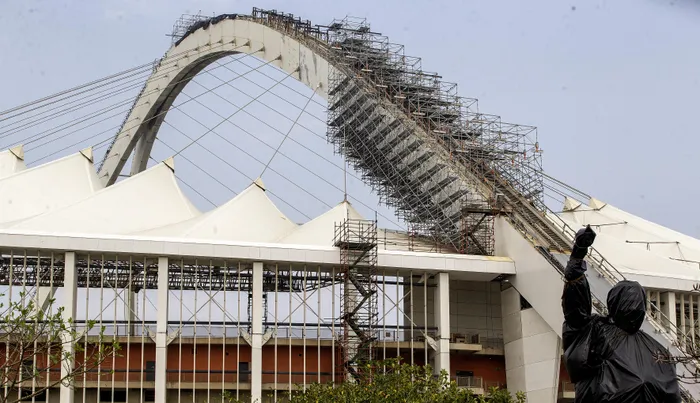
Revitalising the iconic Moses Mabhida Stadium: A transformative upgrade set to boost Durban's tourism and restore its status as a premier sporting destination.
Image: Leon Lestrade / Independent Media
Nestled in the city of Durban, the iconic Moses Mabhida Stadium, which attracts major sporting and tourism events contributing to the local economy, is currently undergoing an extensive multi-year emergency maintenance and upgrade programme.
Completed in 2009 for the 2010 Soccer World Cup, the stadium is named after Moses Mbheki Mncane Mabhida, a key figure in South Africa's democratic and non-racial struggle.
The stadium’s 106-metre "arch of triumph", designed by the Ibola Lethu Consortium, symbolises national pride and is inspired by the "Y shape" of the South African flag.
It seats 56,000, expandable to 85,000. Its 46,000 m² Teflon-coated glass fibre roof is supported by over 1,750 columns and 216 raking beams and the venue also offers 120 luxury suites and business clubs, totaling 7,500 VIP seats.
The stadium gained international recognition after hosting seven FIFA World Cup matches in 2010, including a semi-final on July 7, 2010, where Spain beat Germany 1-0.
Since opening, the stadium's website reports 27 awards and an online poll win for South Africa's most popular stadium.
Last year, Moses Mabhida Stadium was reported as the most utilised 2010 FIFA World Cup legacy facility in South Africa.
The Sky Car, a popular attraction that transported tourists and visitors along the 350-metre arch, ceased functioning more than eight years after the stadium's construction.
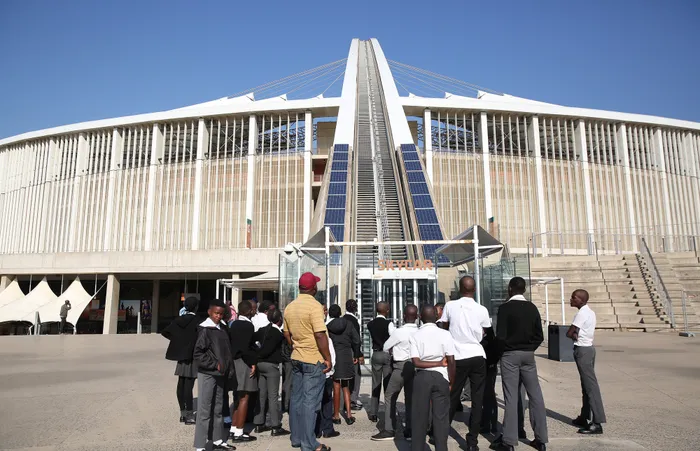
The Sky Car at Moses Mabhida Stadium has not been in operation since 2018.
Image: File Picture: Zanele Zulu/Independent Media
Brett Tungay, East Coast chairperson of the Federated Hospitality Association of Southern Africa (Fedhasa), said that the stadium had been neglected since its 2009 completion.
Tungay noted that "at least the work is finally happening," adding that this is crucial for the hospitality sector.
He said it is better to spend less now than face huge costs later, as seen with Moses Mabhida Stadium and Kings Park Swimming Pool, currently undergoing a R42 million upgrade, he added.
“The restoration of these facilities sets us up for a very good tourism sports destination and we’ve got the climate and hospitality for it and enough hotel beds to match the capacity of these sporting venues,” said Tungay.
According to Tungay, the stadium primarily contributes to sports and events tourism in the city, which is a core component of Durban's tourism sector.
He highlighted that the main loss for the stadium is the cable car and bungee-jumping facilities. Tourism is an activity-driven industry, and increasing the number of attractions in the city would lead to a greater influx of tourists, he emphasised.
Tungay anticipates a positive impact once these activities are reinstated at Moses Mabhida.
He admitted that while there is a short-term negative impact on the businesses at the stadium due to the construction, he believes everyone realises the long-term benefits.
Tungay also shared that various initiatives are in motion to enhance the city’s image as a desirable tourism and events hub, including the maintenance and upgrades to sporting facilities to attract more events, boosting the municipal economy.
eThekwini Municipality spokesperson Gugu Sisilana reported that a meeting on September 2 adopted resolutions to expedite repairs and upgrades and address service delivery issues. Reports will go to the Full Council for approval.
According to Sisilana, progress is being made on the emergency rehabilitation of the concrete and roof structure of the stadium, aimed at preserving its status as a world-class sporting facility and one of South Africa’s premier landmarks.
“The scope of work includes the restoration of steel, concrete, and roof components, with a focus on repairing mechanical joints, treating steel corrosion, and reinforcing the arch structure,” she said.
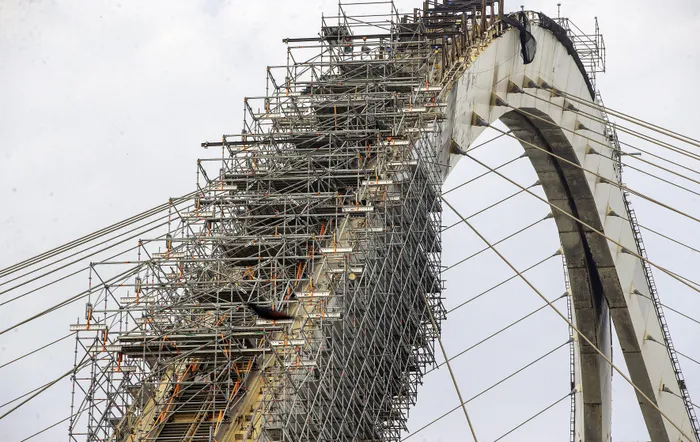
Strengthening the symbol of pride: Essential repairs to the Moses Mabhida Stadium's iconic arch ensure its structural integrity and longevity for future generations.
Image: Leon Lestrade / Independent Media
Sisilana said during the initial phase, which commenced on March 28, 2024, several critical maintenance issues were successfully addressed.
This included the replacement of the damaged roof membrane, application of corrosion-resistant coatings to exposed steel surfaces, replacement of arch cladding, removal of corroded sky car infrastructure, and upgrades to drainage systems to facilitate ongoing maintenance.
During the meeting last week, Sisilana said the Executive Committee endorsed the request to extend the current emergency remedial work contract.
She said the initial 18-month contract amount was R236 million.
While the existing contract is set to expire on 28 September, she said it is anticipated that some essential work will remain incomplete by that date.
“The extension aims to ensure the continued progress of critical repairs necessary to maintain the structural integrity and safety of the facility,” she said.
She said it is envisaged that the remaining rehabilitation work will be completed in the 2025/26 and 2026/27 financial years. “The proposed three-year budget amounts to R284.7 million.”
This includes R19.4 million for structural steel painting, R25 million for the Sky Car, R35.5 million for expansion joints, R135.5 million for cables and the canvas roof, R55.3 million for LED floodlights, R2 million for arch cladding, R6 million for the audio-visual system, R4 million for the big swing, zipline, and adventure walk, and R2 million for the viewing platform.
A report tabled in council last week stated that Phase 2 of the project is budgeted at R53.6 million for 2025/26, R117.3 million for 2026/27, and R113.7 million for 2027/28.
The R53 million budget is for contractor fees, engineering design, monitoring, and compliance.
The 2025/26 budget covers design fees, with major construction beginning in 2026/27 with R117 million for radial cable and tension ring work. R113 million in 2027/28 will complete these essential structural integrity works, focusing on radial cable wrapping and tension ring coating.
Sisilana highlighted that the extension aims to ensure the continued progress of critical repairs necessary to maintain the structural integrity and safety of the facility.
She said the 15-year-old facility, which was built ahead of the 2010 Soccer World Cup, requires a constant maintenance plan.
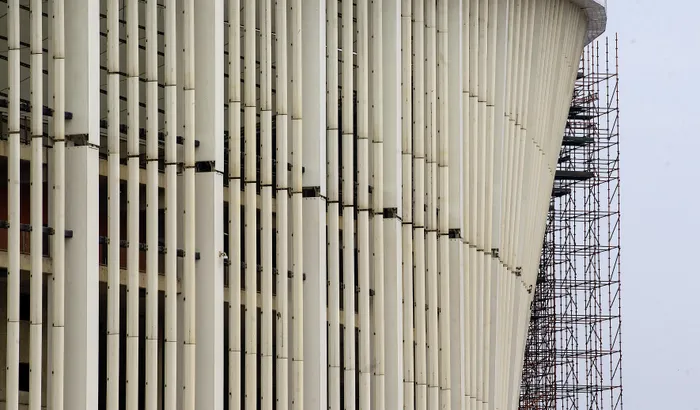
Reinforcing the foundation: Ongoing repairs to the stadium's columns are vital for maintaining the safety and stability of Moses Mabhida Stadium, a cornerstone of Durban's sporting heritage.
Image: Leon Lestrade / Independent Media
According to the city, this plan ensures that the structure is safe for residents and visitors, is operational, and is aligned with evolving technological needs for efficient and profitable commercial operations.
“The stadium remains a critical catalyst for tourism and economic development for the municipality, having contributed millions in revenue through the hosting of mega sporting and entertainment events,” said Sisilana.
Insufficient funding could delay the project into 2028/2029 and 2029/2030, significantly hindering structural and compliance goals, warned the report.
It said this would increase costs and prolong the risk of an aging, partially rehabilitated facility.
The third and final phase of the project will be confirmed based on funding availability, engineering readiness, and operational considerations, it stated.
Future work includes finishing hanger cables, replacing arch cladding and lighting, remedial work on the South Arch and radial cables, and repairs to the canopy, podium, and new lifelines. Light and sound gantry installations will improve event hosting.
The Sky Car, Viewing Platform, and light/sound infrastructure will be upgraded to enhance tourism and spectator experience.
Additionally, the stadium's revitalisation aims to align the facility with modern international standards through significant architectural and branding interventions.
karen.singh@inl.co.za
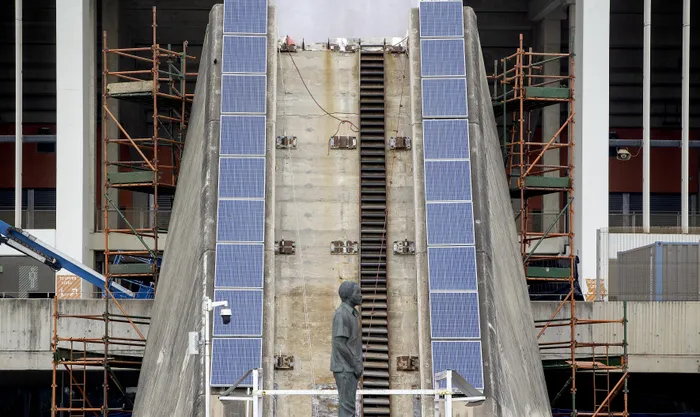
Reviving the thrill: The restoration of the Sky Car at Moses Mabhida Stadium promises to bring back an exhilarating experience for visitors, offering breathtaking views of Durban's skyline once again.
Image: Leon Lestrade/Independent Media